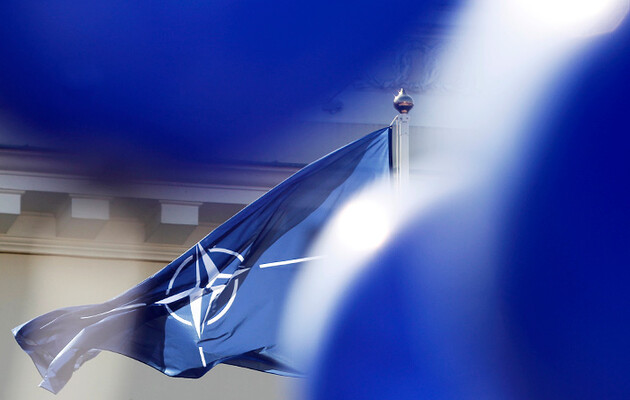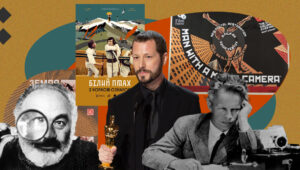"We're here to interact with everyone." Interview with Vineta Kleine, Head of NATO Information Center
How soon Ukraine will join NATO, "colonial policy" and debunking myths

One of the first steps in building the NATO-Ukraine partnership was the opening of the NATO Information and Documentation Center in Ukraine in 1997. Since then, the Center has operated successfully, spreading knowledge about NATO in Ukraine and supporting Ukraine in dialogue with the Alliance. In October 2020, they appointed Latvian Vineta Kleine the head of the Center. We asked her about Ukraine's prospects for cooperation with NATO, how to counter false information and debunk myths, how the pandemic had affected the Alliance's agenda, and why Ukraine's defense reforms alone weren't enough to join NATO.
– Before your appointment at the Centre, you've been working for The European Union Advisory Mission (EUAM) Ukraine. How do you feel about your new position?
– Yes, indeed, this is my second tour of duty in Ukraine. In 2016 and 2017, in the capacity of Senior Strategic Communications Adviser, I led an international strategic communications team of the EU Advisory Mission in Ukraine. I am delighted to be back in Ukraine and to carry on the excellent work of my predecessor, Barbora Maronkova.
– What is exactly that the NATO Information and Documentation Centre do? Is it efficient, in your opinion? Are there areas that would benefit from new approaches, etc.?
– The NATO Information and Documentation Centre plays a key role in promoting a better understanding in Ukraine of NATO's core tasks and priorities, benefits of NATO—Ukraine cooperation as well as in providing support to the Ukrainian authorities in the area of public information and strategic communications.
The Centre was established in 1997, and since then it has been actively engaging with the Ukrainian public to promote dialogue and discussion about NATO and to increase awareness and understanding of NATO in Ukraine.
The communications landscape has changed and continues to change, with a shift to increased digital communications. Accordingly, the Centre actively uses its social media accounts as well as other digital and social media platforms to reach out to the public. We will continue to apply an audience-driven approach to our communications.
– How important, in your opinion, is the personality of the head of the Centre? Does the change of faces affect its work?
– Regardless of who leads, the mandate of the Centre stays the same. The Centre's main task is to ensure that Ukrainians receive complete information about the Alliance, and it is done in a timely, transparent, and effective manner.
I believe that any personality type can be successful in a leadership role. It is important to keep in mind that everyone has a certain set of personality traits. Realizing your personality type and the one of those you work with helps strengthen work relationships and create new opportunities.
– What are the Centre's plans for 2021?
– In 2021, the main tasks of the NATO Information and Documentation Centre will remain the same, namely, to increase Ukrainians' awareness about NATO, promote understanding about NATO's objectives and values, increase knowledge about practical cooperation between NATO and Ukraine, explain NATO's contribution to Ukraine's reform process in the security and defense sector.
We will continue to work with the Ukrainian authorities to strengthen Ukraine's resilience to disinformation campaigns.
Also, we will keep supporting the enhancement of communications capabilities of Ukraine's institutions and to foster cross-governmental cooperation in the area of strategic communications.
– As to 2020, how do you think the COVID-19 crisis has affected NATO's agenda and NATO-Ukraine relations in particular (if it has, of course)?
– This has been a challenging year, and COVID-19 has changed our lives in ways we could barely have imagined a year ago. Accordingly, NATO, like other organizations and governments, had to adjust and be as flexible as possible.
Despite the pandemic, NATO continues to provide significant support to Ukraine in implementing the country's defense and security sector reform. Every day, NATO advisors work with state institutions to implement defense and security reforms and to address corruption risks. A key objective of this cooperation is to strengthen democratic and civilian control of Ukraine's armed forces and security institutions.
On the 12th of June, NATO recognized Ukraine as an Enhanced Opportunities Partner. This is a recognition of Ukraine's significant contributions to Allied operations, the NATO Response Force, and NATO exercises.
NATO has also increased its support in the Black Sea region with exercises, port visits, and information sharing.
I would like to underline that during the pandemic, it is even more important to show that NATO is present and continues to support Ukraine both with advice and practically.
– As far as we understand, the goal of the Centre in Ukraine is to raise Ukrainians' awareness of NATO, to promote an understanding of NATO's goals and values, to increase knowledge, etc. Who is the target audience of your communication? How do you make sure you reach those people?
– It is highly important that the Ukrainian society receives objective and fact-based information about the Alliance, especially in the given circumstances when disinformation campaigns are being actively deployed. That we do together with Ukrainian authorities, civil society organizations, opinion formers, youth, media, and academia.
We are here to inform and engage with everyone who is interested in Euro-Atlantic issues and wants to receive more information about NATO. At the same time, we actively engage with the youth, the media, and representatives of the public sector both in Kyiv and in the regions.
The NIDC uses a variety of public diplomacy tools – people to people engagement (lectures at universities, seminars, conferences, and roundtables as well as street and art exhibits), interviews and articles in the Ukrainian media, and various digital and social media platforms.
In order to ensure the most effective way of reaching out to our audiences, we assess the existing perceptions, information environment, and sources of information.
– Do you see the positive changes in their perception of NATO?
– The perception of NATO in Ukraine is changing, and over the past years, the support of NATO has undergone radical changes. I believe it is important for the Ukrainian authorities to consolidate this support. Right now, the government is developing the communication strategy on Euro-Atlantic integration for the next period. It is vital that the strategy is supported by a robust and realistic action plan and is effectively implemented.
– There are a lot of myths about NATO in general in Ukraine. A few days ago, there was a performance near the American Embassy against the "colonial policy of the States towards Ukraine." A masked man with the image of George Soros threw a leash over a girl in a Ukrainian folk costume. NATO is a part of that 'colonial policy' in the minds of people who believe it. How do you dismantle such myths? What is your strategy with it? Does the Centre work specifically with the people from the East?
– The perception about NATO is changing in a positive direction, nevertheless, there is still much work to be done to disguise wrong myths and stereotypes about NATO.
We are witnessing how state and non-state actors are using disinformation campaigns to undermine the credibility of the Alliance. NATO's response to this is straightforward – we are countering false narratives with facts, with our values, and with concrete actions, which demonstrate NATO's readiness and solidarity.
The Centre also contributes to increasing media literacy, namely, the ability of audiences to analyze information and data critically.
It is important to underline the importance of free media when it comes to countering disinformation.
When speaking about the Centre's activities in Eastern Ukraine, we organize public diplomacy events, lectures, and training to present objective and fact-based information about the Alliance and NATO-Ukraine cooperation.
– Speaking about Ukraine joining NATO. In your opinion, do you think it is a realistic perspective for Ukraine to join the Alliance in the nearest 5-10 years, given the pace of the reforms we have? To which extent Donbas and Crimea issues are standing between Ukraine and its ambition to join NATO?
– NATO Allies welcome Ukraine's efforts to implement major reforms, including the new National Security Strategy, which will help guide security and defense sector reform. Nevertheless, more work needs to be done to consolidate Ukraine's democratic institutions, to strengthen the rule of law, and to fight against corruption. These reforms are essential both to bring Ukraine closer to its European and transatlantic partners and first and foremost to build security and development for all Ukrainians.
What we say to aspirant countries is: reforms of the defense and security sectors are important, but equally important are necessary reforms beyond the area of defense such as strengthening the rule of law, including judiciary reform and oversight of the security services and the security sector in general. All these are key for NATO membership.
– The global pandemic this year forced everyone to move online. Do you think it was a limitation or opportunity to reach wider audiences for the Centre's work, be outside the box or bubble if you will?
– The NIDC, like everyone else, is adapting to the current situation when in-person meetings and engagements are limited. Consequently, we are actively using our social media accounts to inform the public about ongoing support and activities provided by the NATO Representation to Ukraine. Also, we routinely take part in public online conferences, discussions and debates on NATO and security related topics. Further, we are in constant touch with our partners and counterparts because continuous online engagement during the pandemic is vital.
– You have already spent two months in your new position. Your first impressions about the state of affairs must still be fresh – could you share some?
– The environment in Ukraine is very dynamic and I follow events in the country with great interest. I wish Ukraine to maintain momentum for the undertaken reforms. NATO will continue to stand by Ukraine and look for opportunities to assist, provide advice, and work together to create the conditions for peace and security.





